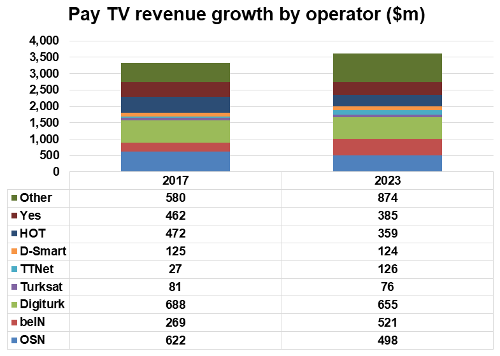Pay TV competition biting in the MENA region
Monday, January 15th, 2018Competition bites for MENA pay TV
Pay TV revenues for the 20 countries covered in the eighth edition of the Middle East and North Africa Pay TV Forecasts report will reach $3.62 billion in 2023 – up by only 7.8% on 2017. Pay TV revenues will fall in 2018. They will be flat in 2019 before starting a slow recovery.
Concentrating just on the 13 Arabic-speaking countries, pay TV revenues will grow by 24% from $1.18 billion in 2017 to $1.46 billion in 2023, despite pay TV subscriptions rising by 47% over the same period to 5.84 million. If subscriptions are growing faster than revenues, then ARPUs must be falling.

Source: Digital TV Research
Simon Murray, Principal Analyst at Digital TV Research, said: “The region has always been difficult for pay TV, with many homes receiving many FTA channels and rampant piracy being commonplace. beIN is shaking up the market with its strong slate of exclusive sports rights. beIN is now providing more entertainment content.”
beIN’s moves have hit long-established rival OSN. OSN benefits from exclusive long-term deals with all of the Hollywood studios. However, OSN has struggled to push its subscriber base much beyond 1 million subscribers.
Murray explained: “Competition is increasing – not only from beIN, but also from the multitude of SVOD platforms that have launched in recent years. These platforms compete more directly against OSN than beIN due to their emphasis on drama. No SVOD platforms can compete against beIN with live sports provision.”
Murray continued: “OSN’s reaction was to cut its subscription prices substantially in February 2017. Digital TV Research believes that further cuts will be made as OSN struggles to hold on to its subscriber base until its fees are just above beIN’s.”
OSN’s revenues will reach $498 million in 2023 – down from $700 million in 2015. beIN’s revenues will exceed OSN’s in 2022. beIN’s revenues will double between 2016 and 2023.
beIN will overtake OSN by subscriber numbers in 2018. beIN is forecast to have 1.87 million satellite TV subscribers by 2023 – ahead of OSN’s 1.46 million [so excluding subscribers to their channels on other platforms such as IPTV and cable].
beIN’s sister company Digiturk will retain regional market leadership despite more intense competition in Turkey.
Israel will experience cord-cutting. Israel will lose 27,000 pay TV subs between 2017 to 2023. We forecast that Israeli pay TV revenues will fall from more than $1 billion in 2015 to $767 million in 2023 as cheaper OTT platforms force traditional pay TV operators to lower their fees.
Latest News
- Barb to start reporting TV-set viewing of YouTube channels
- SAT FILM selects multi-DRM from CryptoGuard
- Qvest and ARABSAT to launch OTT streaming platform
- ArabyAds & LG Ad Solutions partner with TVekstra in Turkey
- Freeview NZ satellite TV service to move to Koreasat 6
- Comscore expands YouTube CTV measurement internationally
